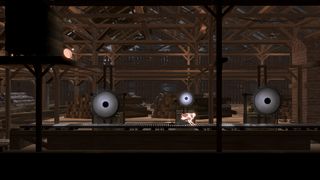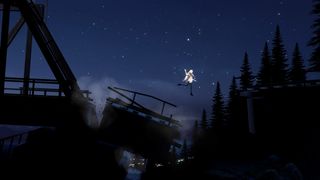Like the nation it's named for, Americana has no singular origin. It can mean many things to many people, drawn from all kinds of provenances - classic Westerns, Route 66 road trips, 1950s Hollywood, aging chotchkies. For Hidetaka 'Swery' Suehiro, director of such eclectic cult classic games as Deadly Premonition and D4: Dark Dreams Don't Die, Americana traces back to James Dean, Marilyn Monroe, and a good old-fashioned donut. Swery's latest work, The Missing: J.J MacField and the Island of Memories, once more taps into Americana as seen through the lens of a Japanese developer and his team at White Owls Inc. This puzzle platformer is a head trip both literally and figuratively, starring a borderline immortal protagonist who can survive dismemberment from the neck down as she braves a haunting landscape while searching for a lost friend. Speaking with me through a translator, Swery puts it best when he calls it a "very extreme gimmick."
The Missing owes much to the stark, disturbing, slower-paced sidescrolling of Playdead's Limbo and Inside, though Swery also cites old-school favorites like Prince of Persia, Another World, and The Magical Quest starring Mickey Mouse as inspirations. Our hero J.J. (short for Jackie Jameson) finds herself separated from her best friend Emily on the mysterious Memoria Island, and reuniting means going through hell across a variety of 2.5D levels. During my playthrough of three levels, I pushed crates, climbed ropes, and collected sprinkled donuts suspended in midair - but more than anything, I made J.J. hurt herself over and over in order to move forward. An early example is a puzzle involving a seesaw, where you must run headlong into spikes, tearing your limbs off in the process, so you can throw them to the other side to act as a counterbalance while you crawl (or roll, if all you have left is your head) across.
Some readers chastised me for criticizing the way Inside graphically (and repeatedly) kills its child hero, but I won't apologize for empathizing with a playable character's suffering. And playing The Missing tapped into that same unsettling feeling. This young woman in her late teens puts her body through all kinds of carnage in the name of level progression, complete with pained yelping, bones crunching, and the wet squelching of exposed trachea slapping on the ground when she's rolling around as nothing but a head. J.J. is only unkillable up to a point: if you take a hit when she's a severed head, you'll be sent back to a checkpoint. In some sections, J.J. must get pulverized by a swinging wrecking ball (which flips the world upside-down, for some reason); in others, you need to make her walk through fire, immolating her body to burn vines that block your path while J.J. screams in agony all the while.

Curious, I ask Swery if he expects that last one to be a hard stop for some players who'd rather quit then and there than put J.J. through further trauma. "I think that will be an experience that a lot of people will have with this game," he says. "However, it's not there just to be gruesome and grotesque - it's grounded in reason, and has a purpose. And that gets revealed [over time], especially at the very end. What I hope is that someone who, at first, may be taken aback, and is reluctant to play, will actually take the time to beat the game. And when they beat the game, they'll tell everybody else 'Hey, this might look very scary and grotesque, but do play it, because it has a meaning to it.'" Swery likens his aims to The Sixth Sense - something you refuse to explain when recommending it beyond "just trust me."
Mercifully, these scenes aren't shown in torture-porn detail: whenever J.J. sustains any injury, she's rendered as a silhouette (with the occasional skeleton x-ray when bones are shattered, or electrocution occurs). "The reason why we did this whole blacked-out silhouette when you're hurt is: because this game requires you to get hurt many times, and experience pain many times, it is very graphic," Swery explains. "So we didn't want the player to feel too resistant to it; we blacked those aspects out to balance the idea of having to do this multiple times, but not be too grotesque, not too devastating, for the player."

Beyond all the bodily harm, The Missing has plenty of Swery's trademark attention to subtle, delightfully strange details. As you explore, you'll receive text messages from all kinds of folks - including your seemingly sentient, decrepit stuffed animal F.K. and a host of supporting characters with their own distinct speech patterns in terms of text length, frequency, and colorful language. The text exchanges even include adorable (and often crass) iMessage-esque stickers, many of which feature a donut mascot who resembles the burger-exalting Big Boy. Collecting the sprinkled donuts that dot each level - and which just so happen to be J.J.'s favorite food - unlocks all kinds of content, including additional text threads that provide more insight into J.J.'s past, concept art, alternate costumes, and even cheat codes (like the ability to make J.J. move faster than her usual plodding pace). For the record, Swery himself prefers donuts at their most plain, no glaze or sprinkles necessary.
Most stages have a serene, outdoorsy feel to them when you're not self-mutilating to make progress. Just as Deadly Premonition was based on Twin Peaks' Washington and D4 takes place in Boston, Massachusetts, The Missing's Memoria Island is meant to evoke Maine. "Back when I was creating D4 and researching Massachusetts, people were saying 'Hey, if you go to Maine, there's a lot more nature, and it's more beautiful,'" says Swery. "When I was a kid and hadn't been to the US, I thought Hollywood was the heart of Americana. But [actually] visiting the US, I didn't think that too much. Once I visited the countryside, that's when I really felt like 'Oh, this is very American.' Whenever I visit these countryside towns, I go to a diner, order a donut and coffee or something. I do that, then I go home and make games, and usually those experiences get reflected in my games."

The exception to the quiet countryside are a handful of chase scenes, as J.J. flees from the monstrous Hair Shrieker, a hulking apparition with hands for feet and a gigantic boxcutter she maniacally swings around. That makes The Missing an interesting first for Swery, with (what currently appears to be) an all-female cast, with protagonist J.J., deuteragonist Emily, and the antagonistic Hair Shrieker that skulks in the shadows. "I've tried making games [starring] female characters before, but couldn't do it because of the market situation at the time," says Swery. "So I've always wanted to have a female protagonist - and now that I've done it, it's been quite revealing, and a good learning experience. I think a lot of male players may look at a game like this and say 'Oh man, I don't want to hurt this female character, it's very hurtful for me to do.' But I also created a female character because I wanted more females to play. When they play it, they have a mirror reflection of themselves within the game, so they take it very differently compared to male players... This whole idea of trying to find a friend, save a friend - I think it's more feminine thinking, so I think that's why I decided to use a female character, to really drive that home."

When I casually compare Swery to other Americana-obsessed Japanese auteurs like Hideo Kojima and Goichi Suda, he seems amused. "I think both Kojima and Suda are a little bit older than I am, but I think when we were little, back in the day, that was a lot of American TV that was airing in Japan," he recalls. "So we sort of grew up with that; we were surrounded by American shows and movies back then." One particularly formative screening was seeing Terry Gilliam's Brazil as a youngster ("Shocking, so shocking!" laughs Swery).
Swery diehards and puzzle platforming fans with a penchant for the bizarre can play The Missing: J.J MacField and the Island of Memories when it hits Switch, PS4, Xbox One, and PC on October 11. As for the role of Americana in the gaming landscape, Swery holds games like No One Lives Forever and the Fallout series in high regard. He'll continue making experiences that keep his vision of Americana going, no matter what the competition is up to. "Regarding the general public, I don't know how much Americana is still valued or is still in people's minds," he muses.
For more on Swery's work, be sure to read our Deadly Premonition retrospective.


